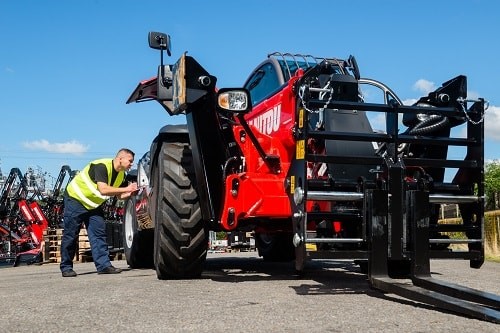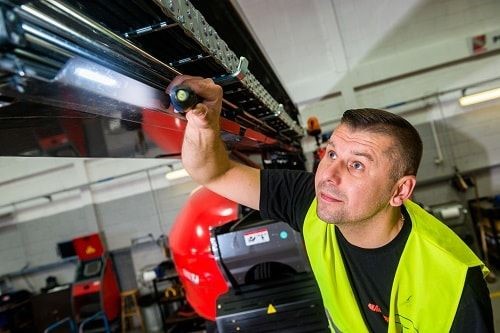Thorough examinations of forklift trucks are vital to ensure they remain safe to use.
Features
A real examination
Any business that owns and uses work equipment on site, such as forklifts and telehandlers, has a responsibility to operators to make sure that the equipment is safe to use. The best way to do that is to ensure that they receive a Thorough Examination at least once a year, in accordance with the law.
A Thorough Examination is roughly the equivalent to an MOT for a car. But whereas MOTs have a standardised set of requirements, there is no such consistency for lift trucks. Different inspectors can carry out varying degrees of checks, potentially to the detriment of the operator and the business.
In response to this problem, the British Industrial Truck Association and the Fork Lift Truck Association worked more than 15 years ago in consultation with HSE to create a dedicated organisation responsible for administering a national accreditation scheme for Thorough Examinations – known as Consolidated Fork Truck Services (CFTS).
 Photograph: CFTS
Photograph: CFTS
Adhering to a definitive quality-controlled procedure, a CFTS Thorough Examination inspects safety-critical components in alignment with two essential pieces of legislation: the Lifting Operations and Lifting Equipment Regulations 1998 (LOLER), which covers the lifting parts of the truck as well as mast forks and chains; and the Provision and Use of Work Equipment Regulations 1998 (PUWER), which covers safety-related items, such as brakes, steering and tyres.
A CFTS Thorough Examination also provides a rigorous 34-point procedure specifically for attachments.
The CFTS standard has been developed to meet the needs of the wide range of lift trucks in operation so the exact nature of the inspection is appropriate to the equipment.
Companies will often be happy with their insurance inspection or hear that they’re getting a ‘thorough examination’ and simply assume that everything will be checked. When operations are busy it’s understandable that things might be taken at face value, but not all inspections are created equal. Without standards for Thorough Examinations – such as those employed by CFTS-accredited companies – businesses have no guarantee that their equipment will get the same level of inspection each time.
It has been known that some inspection providers conduct these vital checks in as little as 15 minutes. These are complex inspections which should cover a wide number of areas. For example, a typical check of a 1.5-tonne three-wheel electric forklift should take upwards of 45 minutes, or however long is required based on a truck’s complexity. If it’s finished in a third of that time, how thorough can it be?
A CFTS Thorough Examination takes longer as examiners follow a strict process, and this requires performing accurate physical examinations on key components.
Lift truck chains, for example, are a vital component of the lifting mechanism.
That’s why every CFTS examiner is trained to identify chain damage and to use an accurate chain gauge which precisely measures wear in a repeatable manner.
Reliably thorough
CFTS-accredited examiners are experienced, specialist engineers who possess the in-depth knowledge to identify and categorise defects clearly and make truck owners aware of actions needed to rectify any issues.
Their training includes a demanding Thorough Examination course, and refresher training once every five years. In addition, they must meet CFTS’ nationally agreed criteria.
Likewise, high levels of training and experience are expected and required of their managers – ensuring that businesses choosing CFTS for their Thorough Examination receive the highest quality service.
Each company accredited to CFTS is routinely inspected and operates in alignment with up-to-date regulations. For anyone reconsidering their Thorough Examination provision, it is worth noting that insurance companies have no legal right to insist that their own inspectors carry out your Thorough Examinations. You are perfectly at liberty to make your own arrangements (which may prove cheaper as well as more thorough).
The rising costs of accidents
While the majority of workplace accidents are down to human error, regular maintenance and examination of work equipment can help to significantly reduce the number of incidents that occur due to mechanical failure.
Ensuring that trucks have undergone a Thorough Examination at recommended intervals is a key step you can take towards a safer workplace. Should something go wrong due to a mechanical failure that would otherwise have been caught, the impact can be devastating – both to the parties involved as well as to your bottom line.
Updates to the official health and safety sentencing guidelines for the criminal courts in the past couple of years have meant that fines for rule breaches are now proportionate to a company’s turnover – with the potential for some huge figures.
Fines of six or seven digits are now not uncommon in serious cases, so more than ever it pays to stay within official guidelines.
 Photograph: CFTS
Photograph: CFTS
Safety for small trucks
Complying with LOLER and PUWER regulations is a significant responsibility for companies that use lift trucks. However, there is often much confusion when it comes to manual and powered hand pallet trucks.
CFTS offers clear positions on the required inspections for hand pallet trucks, which have also been confirmed by the HSE.
In summary:
- Pallet trucks that lift above 300mm must have a Thorough Examination in accordance with LOLER and be inspected under PUWER
- Pallet trucks that lift below 300mm are not subject to LOLER and do not require a Thorough Examination but must be inspected in accordance with PUWER.
The clarification appears in the June 2018 update to HSE’s Approved Code of Practice, Safe use of lifting equipment – Lifting Operations and Lifting Equipment Regulations 1998 (L113). This publication is free to download here.
Is your site damaging your equipment?
Abrasive materials and certain chemicals can shorten the life of important components, and work equipment used for heavy-duty operations may require more frequent Thorough Examinations than owners think. CFTS believes certain industries are at higher risk of fault-related accidents if they do not arrange inspections often enough.
Operations such as construction, metal manufacturing and aggregate processing use abrasive materials, which over time can damage equipment.
Similarly, if a truck is used on a site where chemicals are present, corrosion is a serious hazard to look out for. For example, chains are vulnerable, even though they have been made and tested for the stresses of day-to-day operations. A CFTS Thorough Examination will identify any signs of corrosive fatigue on chains or other lift truck components.
The type of truck and the use of attachments will affect when you book a Thorough Examination. If it has fitted attachments, an inspection must be arranged every 12 months. This changes to six months if attachments are not permanently fitted to the truck or if the truck has an elevated operator position or working platform for lifting personnel.
The amount the truck is used also plays a significant role in determining how often an inspection is needed. Get it checked every four months if it is used over 80 hours a week, every six months if it used 40 to 80 hours a week, or every 12 months if it is used under 40 hours a week.
If you are planning on making any changes to your work equipment or how it is used, then your Thorough Examination intervals might be affected. A CFTS-accredited Thorough Examination engineer can help you determine this.
The importance of Thorough Examinations in agriculture
Telehandlers and rough terrain forklifts are used a lot within the agricultural sector, and should be inspected often, but there is some confusion around Thorough Examination requirements for these vehicles. Many truck owners believe statutory inspections are part of servicing, or are unsure about what needs to be checked and when. Thorough Examinations are in fact a legal requirement for all lift trucks and must be completed at least once every 12 months.
Truck owners working within the agriculture industry often maintain their trucks in-house and in many cases tend to change attachments depending on their application. For a truck to remain legally compliant and safe to use, removable lifting attachments must be subject to a Thorough Examination at least every six months. It’s also vital that a truck is inspected by a competent and suitably qualified engineer.
Look for the mark
CFTS is identified by its distinctive kitemark, found on literature, certification, reports and truck stickers that advise when the next examination is due. Only companies officially accredited to CFTS are able to use this certification mark.
For more information see: www.thoroughexamination.org
T. 01344 623 800
Geoff Martin is chairman of CFTS.
FEATURES

Sedentary working and how to combat the ‘sitting disease’
By Gavin Bradley, Active Working on 05 April 2024
Prolonged and excessive sitting poses a major risk to our health, but the Get Britain Standing campaign and On Your Feet Britain Day on 25 April are a great way of encouraging workers to sit less and move more.

Company culture and wellbeing: a crucial link
By Bex Moorhouse, Invigorate Spaces on 05 April 2024
Investing in measures to support worker wellbeing will be ineffective unless the company culture genuinely incorporates values like teamwork, involvement, flexibility and innovation.

Office design and culture: happier and healthier staff – or the opposite?
By Guy Osmond, Osmond Ergonomics on 03 April 2024
Applying ergonomic principles to workstation set-ups and ensuring the physical environment supports neurodivergent people are just some of the ways of creating an office where everyone can thrive, but a supportive and positive organisational culture is vital too.


